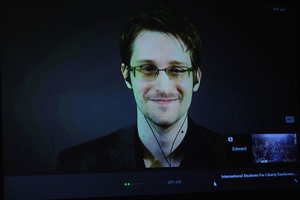Edward Snowden calls for global push to expand digital privacy laws
Edward Snowden has called for a global push to protect people’s rights to digital privacy, arguing that now the bare facts of mass data surveillance are known it is time to “assert our traditional and digital rights so that we can protect them”.
 Speaking by video link from Russia where he has been granted asylum, the former National Security Agency contractor and whistleblower said efforts to protect privacy “will continue for many years”, culminating, he hoped, in a world in which governments could be relied upon to defend their citizens’ rights rather than “working against them”.
Speaking by video link from Russia where he has been granted asylum, the former National Security Agency contractor and whistleblower said efforts to protect privacy “will continue for many years”, culminating, he hoped, in a world in which governments could be relied upon to defend their citizens’ rights rather than “working against them”.
Snowden’s call for new international laws to protect data privacy was made at the launch in New York of the so-called “Snowden Treaty”, a fledgling campaign designed to apply pressure on governments around the world in the hope of generating new legal protections. The “treaty” idea, which is being disseminated with the help of the online campaigning network Avaaz, is intended to generate new safeguards both for personal data and for whistleblowers and journalists vulnerable to government prosecution.
A draft version of the putative treaty was circulated at the launch. It says governments signing up to the agreement would have to commit to ending mass surveillance and “the right to privacy in all future programs and policies. This will make the preservation of privacy a fundamental responsibility of governments, ensuring the protection of these fundamental human rights for generations to come.”
Snowden said in his video-link address that the debate sparked by his leaking of a vast hoard of NSA secret documents to journalist Glenn Greenwald and the Guardian had succeeded in changing public culture. “We can discuss things now that five years back would have gotten you labelled as a conspiracy theorist,” he said.
It was now established, he went on, that in the arena of basic individual liberties – what happens when we travel through a city, or talk to our friends, or browse for books online – we are being tracked and recorded. He said that whole populations were being “indexed into a sort of surveillance time machine that allows institutions, whether public or private, to empower themselves at the expense of the people.”
In the wake of his disclosures, Snowden said that there had been some legislative attempts to tighten up on privacy and rein in mass surveillance. But they were “just the first step – they don’t go anywhere near far enough”. Meanwhile, countries were aggressively pressing to increase their surveillance powers. Not just traditional adversaries of the west such as Iran, China, Russia and North Korea, but also allies of the US such as Australia, Canada, the UK and France.
“What’s extraordinary is that in every case these policy proposals that work against the public are being billed as public safety programs. Yet mass surveillance has never made a concrete difference in any single terrorism investigation in the United States.”
The “Snowden Treaty” is the brainchild of David Miranda, who was detained and interrogated under the UK Terrorism Act at Heathrow airport for nine hours in August 2013 at the height of the Snowden leaks. Miranda, who is Greenwald’s partner, said that the new campaign was partly inspired by the efforts taken by big tech companies such as Apple, Facebook and Google to offer encryption services to their users.
“This is not a dream. If corporations are taking moves to protect themselves, then why can’t we?” he said. Miranda said that several governments had been approached around the world, but he declined to name any that were showing interest.
Axarhöfði 14,
110 Reykjavik, Iceland














